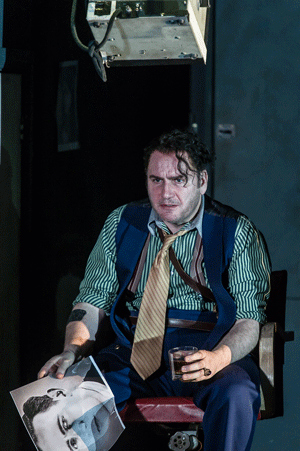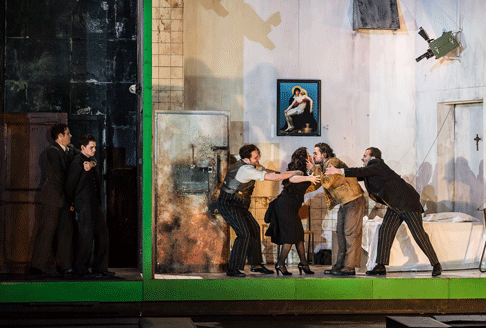A full-ish house for the first night seemed from the
start inclined to be indulgent and supportive (does a Friday night after a long
week in the office in London help a new production? Discuss......) and was
helped along by what sounded suspiciously like a small claque cheering
from the very first da capo aria (“let’s get this lot going chaps”?)
without, it has to be said, that much cause at that particular moment.
 John Mark Ainsley as Grimoaldo
John Mark Ainsley as Grimoaldo
Never mind, the audience did not need much further encouragement to applaud
as we were that night treated to one of the finest expositions of handelian
singing across the vocal spectrum that we’ve heard for quite a while. A
superb collection of the best British singing talent gathered under one roof to
show the world how Handel should — ought — to be sung. John Mark Ainsley,
(Grimoaldo), Susan Bickley (Eduige), Iestyn Davies (Bertarido), and Rebecca
Evans (Rodelinda) took on the leading roles in this tale of loyalty, power,
love and lust and gave full measure at every turn. They were supported no less
ably by Richard Burkhard (Garibaldo), Christopher Ainslie (Unulfo) and Matt
Casio (a non singing, but certainly acting Flavio). One could spend paragraphs
praising each performer’s intelligent and musical interpretations, but
suffice to say that there was not one weak link in this chain of excellence
although inevitably both Evans and Davies, as chief protagonists and with the
most sublime and ferocious arias to their credit, did receive the loudest and
longest ovations come the end of three plus hours of Mr Handel at his best. And
each singer of course supported by the dash, drive and commitment to baroque
style that Christian Curnyn supplied from the pit.
I mentioned loyalty as a major driver in the plot: it came through again and
again both within the personal relationships of the characters and in their
wider political and philosophical concerns but it was loyalty much closer to
home which worried this writer most. One wishes only success and financial
security for English National Opera as it goes forward from some pretty torrid
times; one wishes that Handel’s greatest works should become loved by ever
larger audiences in ever more numerous productions; one wishes that more opera
house orchestras could adapt as stylishly to baroque details as does ENO’s;
and one wishes our British theatrical production talents ever more plaudits
both here and overseas as they bring new ideas and angles to old favourites.
However, the elephant in the room on Friday night, it must be said, was this
very thing. Peter Jones has already garnered many plaudits for his theatrical
insight and challenging productions around the world, but on leaving the
theatre on Friday night it became clear that this production was splitting
people down the middle.
 A scene from Rodelinda
A scene from Rodelinda
A straw poll aftewards produced extremes of reaction:
“marvellous, clever, thought-provoking” at one end and “poor singers, how
did they produce such excellence within such dire, distracting drivel?” at
the other. To be fair, he and his team did (mostly) give the singers both space
and focus on the stage for their big numbers; it was all the stuff in between
that in this writer’s opinion was either indulgent, patronising or plain
wrong. Once again, poor Mr Handel has suffered from a director’s inability to
trust the music, an inability to understand that emotion, conflict and
psychological evolution is already there — on the score, within the bars and
notes, riding on the swell and trough of fine singing. Others will disagree, no
doubt; some will say it’s a modern masterpiece; only the audiences of the
future will decide and let’s hope they do in droves. What is without doubt is
that Rodelinda will survive it all and with singers as good as we
heard in the Coliseum we can rest assured that Mr Handel will always have the
last word.
Sue Loder
Until 15 March. Tickets: 020 7845 9300; www.eno.org


